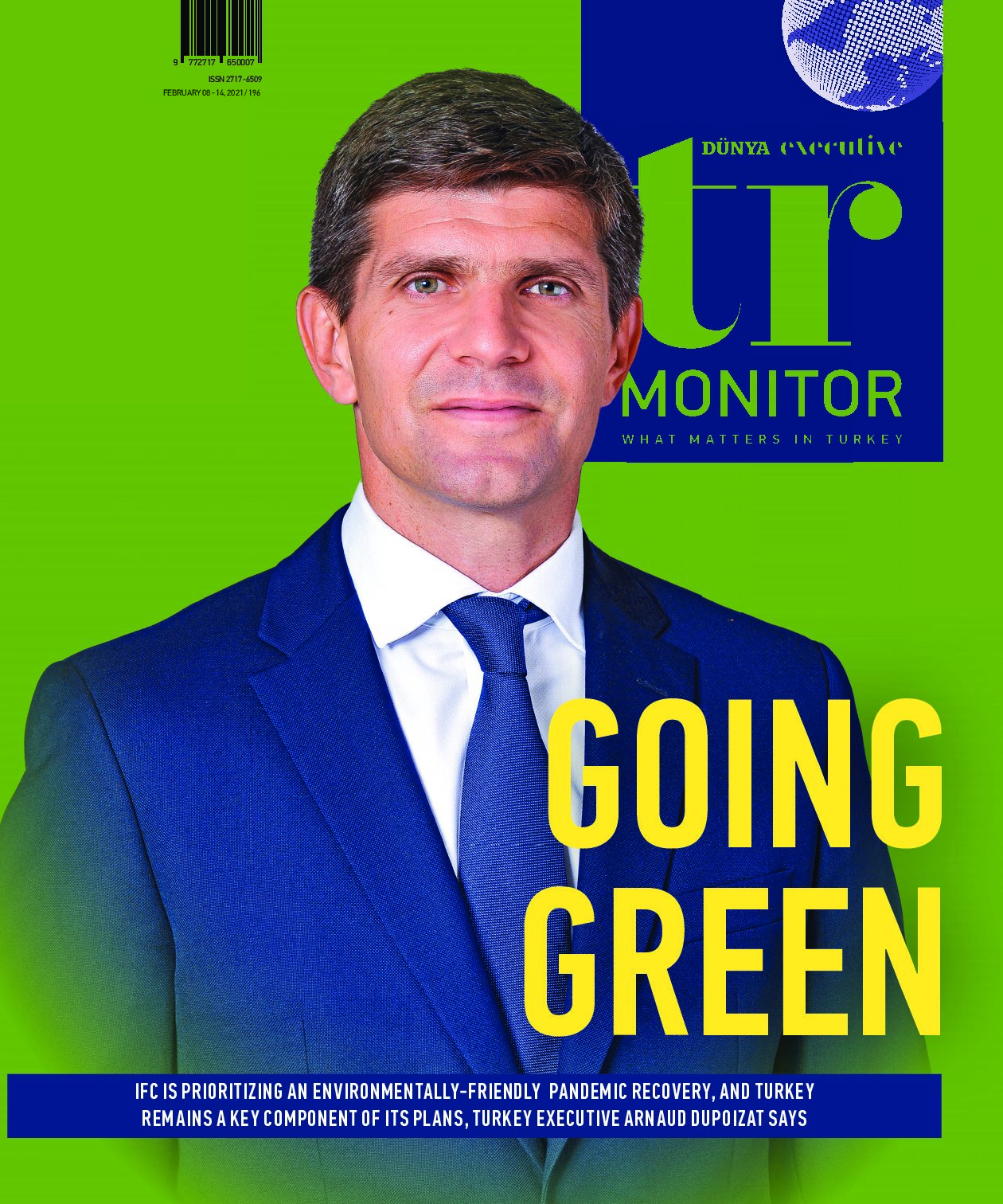By DIDEM ERYAR UNLU
THE EUROPEAN UNION’S Green Deal Plan will directly impact Turkey’s exports to the European Union—its biggest trade partner— and is likely to trigger a structural change in its production structure. Because shiftng to a low-carbon economy requires substantial investment, the role of the finance sector and development banks is crucial. The World Bank Group’s International Finance Cooperation, a supporter of sustainable development in Turkey since 1956, is determined to back this shift in the country with a focus on energy efficiency and climate finance for investments in 2021.
The private sector’s interest in green finance is strong in Turkey, says Arnaud Dupoizat, IFC Country Manager for Turkey & the Russian Federation. The deal will especially affect the transportation, environment, and energy sectors, Dupoizat says. “With a quarter of the EU-28 greenhouse-gas emissions coming from the transport sector, alternatively-powered vehicles will be further promoted across Europe. This will promote substantive changes in Turkey’s transportation sector and the flourishing automotive manufacturing industry.”
Turkey, on the other hand, is one of the top 10 most energy-intensive OECD countries. So, climate finance to support a green recovery will trigger a structural economic change, Dupoizat adds, and the effects will be positive in the medium term. “Improving energy efficiency is crucial for reduced reliance on expensive energy imports and boosting export competitiveness,” he says. IFC will remain as an important supporter of Turkey in this respect, the country with the second-largest investment portfolio for IFC globally.
“Our strategy is to support Turkey toward productivity gains, sustainable infrastructure, innovation, integration in global value chains, greater financial inclusion, and an accelerated transition to a greener economy.”
Turkey is a key nation for the IFC. During the 2020 fiscal year, which ended in June, IFC invested close to USD 1bn in Turkey, including USD 465m mobilized from other investors. IFC also supported over USD 500m of cross-border trade with Turkey through banks participating in its global trade finance program.
“The largest part of our exposure in Turkey is to the financial sector, followed by significant exposure to infrastructure, power and municipal business, as well as manufacturing and healthcare,” says Dupoizat adding that the IFC also has exposure to private and technology funds.
COVID RESPONSE FACILITATED IN 2020
IFC’s primary focus for most of 2020 was to help cushion the impact of COVID -19 on the private sector, particularly on SME operations, keeping companies afloat, and saving jobs. IFC’s global COVID response facility provided shorter-term liquidity support to SMEs through banks. Specifically targeting micro, small, and medium enterprises (MSMEs) impacted by the pandemic, a USD 25m loan was provided to Alternatifbank in 2020. Garanti BBVA and Yapi Kredi Leasing were also provided with USD 50m each for the same purpose. Just before the crisis, IFC also set up a facility of over USD 130m to Garanti BBVA for lending to MSMEs in the least developed regions of Turkey and in host communities where the impact of Syrian refugees under temporary protection was the greatest.
The digital ecosystem was another area of focus in 2020. IFC provided EUR 15m to Revo Capital Fund II. Through financing, IFC also supported the expansion of critical logistical infrastructure— with a green element—in Mersin Port and Asyaport in Tekirdag and entered into over USD 250m of trade portfolio risk participation agreements. The most recent loan deal was with Ford Otosan in July. A USD 150m loan was provided for one of Turkey’s biggest vehicle manufacturers to boost its production capacity and launch new vehicle models.
FOCUS ON ENERGY EFFICIENCY AND CLIMATE FINANCE
Dupoizat does not have a figure yet for the 2021 budget but speaking about areas of focus during the year ahead he says that credit lines and various forms of funding to the banking sector for on-lending to critical sectors, with a focus on MSMEs, will continue due to insecurity about COVID-19. Trade finance flows in Turkey will also continue to be supported. “Energy efficiency and climate finance will remain our focus for investments. We will also focus on growth capital through private equity funds to promote entrepreneurship and support start-ups, primarily in the technology space,” he says.
The role of the finance sector and development banks is crucial for a shift to a low-carbon economy, Dupoizat says, because it requires significant, long-term funding not easily available, especially in lowand middle-income countries, and for small and medium enterprises (SMEs). “The finance sector and development institutions can play a key role by deploying local capital and aggregating smaller transactions in clean energy, climate-smart agriculture, green buildings, and green mortgages, raising and mobilizing funds for projects that will support the transition.”
The Finance in Common Summit, organized on November 9-12 last year, also underlined the crucial role of development banks to help increase sustainable investments that will have a long-term impact on the planet. In addition, development institutions help financial institutions in the developing world to build capacity and acquire know-how that is essential for financing climate projects.
GREEN BANKING CHAMPIONS
“IFC is well-positioned to show its partners how to set up lending and monitoring systems and standards to use while financing and monitoring such projects,” says Dupoizat, adding that IFC also provides technical assistance to help local banks build their green finance business so that they can position themselves as green banking champions.
“At IFC, we are making a tremendous effort to ensure our contribution to the recovery process [from the pandemic] is ‘green.’ With weather events more frequent and extreme, food and water security are at risk, threatening agricultural supply chains and many coastal cities. Lower-income countries are particularly vulnerable. IFC is at the forefront of developing guidance for adaptation investments in the private sector, integrating climate risk management measures and sustainable business models that protect biodiversity.”
INTEREST IN GREEN FINANCE STRONG IN TURKEY
“The private sector’s interest in green finance is strong in Turkey. While sustainable lending is a focus, the country’s financial institutions were among the first in the world to issue green bonds. Turkey’s power generation and distribution sectors are mainly in the private sector’s hands, and renewable energies have expanded significantly. IFC works with several municipalities in Turkey as part of its sustainable and smart cities program, where a large focus is on green transportation and environmentally friendly utilities. The Ministry of Energy and Natural Resources has also issued a National Energy Efficiency Action Plan, which runs until 2023.”
RECENT COOPERATION WITH TKYD
“To advance gender diversity on boards, IFC has a partnership with the International Women Directors Network. While we have an ongoing partnership with the Turkish Industry and Business Association (TUSIAD) on private sector matters, investments, and sustainable development, we recently cooperated with TKYD (Turkiye Kurumsal Yonetim Dernegi /Corporate Governance Association of Turkey) and YUD (Board Directors’ Association/ Yonetim Kurulu Uyeleri Dernegi). With IFC’s updated Governance for Sustainability Methodology and other resources, together with TKYD and YUD, we aim to promote Corporate Governance and ESG standards, focusing on the governance of E&S practices to strengthen the private sector in Turkey and ensure its sustainability.”
65 YEARS OF SUPPORT IN PRIVATE SECTOR
>> 1956: The Republic of Turkey became a founding member of IFC with USD 476,000 capital.
>> 1964: Turkey got its first loan from IFC through the Turkish Industrial Development Bank. The projects supported in Turkey focused on machine and equipment, textile, tourism, agriculture, manufacturing, iron and steel, capital markets and financial services
>> 2001: IFC opened a new office in Turkey that would act as a regional hub for IFC investments in Southern Europe and Central Asia.
>> 2007: 42% of IFC credits were in finance and insurance sectors while ICT and consumer goods constituted 13% and 12%, respectively between 2002- 2007.
>> 2008: Turkey supplied a USD 5.8bn fund, USD 2.1bn of which was has been syndicated loans until today.
>> 2010: IFC’s Istanbul office became the IFC’s first Operations Center outside Washington, D.C. It serves 52 countries in Central and Eastern Europe, Central Asia, Southern Europe, the Middle East, and North Africa.










